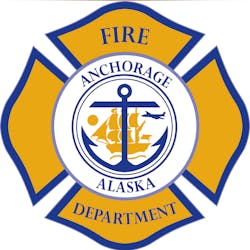Jan. 17--Along the Eagle River Valley, Turnagain Arm and a few other far-flung parts of Anchorage, a burning house or a brush fire poses a thorny dilemma for the Anchorage Fire Department.
Property owners in some of the city's more rural regions don't pay taxes for fire service. A bill can be sent later if the Anchorage Fire Department decides to respond to a call, which was the case for a fire at the Turnagain Arm Pit restaurant in June 2016, and a house fire off Eagle River Road in September.
But in both those cases, the final bill amounted to less than $5,000, a fraction of the total cost of the response, said Jodie Hettrick, deputy chief of operations at AFD.
The resulting cost-shift to other taxpayers reflects a long-standing problem of paying for fire service in every part of Anchorage. One partial solution will likely appear on the city ballot in April: Anchorage Assemblywoman Amy Demboski wants voters to decide whether to add roughly 500 Eagle River Valley properties to Anchorage's fire service area.
The measure would mean an immediate tax hike for Eagle River Valley residents -- about $700 more each year. But without paying taxes, residents may soon face much more massive bills for fire response. Demboski's proposal comes as the fire department is examining ways to substantially raise its billing rate for calls outside the fire service area.
Hettrick said that while officials are still collecting data, it's apparent the rates are too low. The late October fire in Eagle River Valley cost between $12,000 and $15,000, more than double the final bill to the homeowner, Hettrick said. She said she expects the department to recommend a new set of rates to the Assembly in the coming months.
Meanwhile, the Anchorage Assembly is set to vote next week on whether to send Demboski's proposal to the ballot. The measure would need to be separately passed by a majority of affected homeowners in the Eagle River Valley, and a majority of voters in Anchorage's existing fire service area.
Demboski said she decided to pursue an annexation proposal after the Turnagain Arm Pit fire, when fire officials said the rates were far too low. She said she hoped to get ahead of the issue and give her constituents a choice.
"Really the choice is, do you want to pay the increase in property taxes to join the Anchorage fire service area, or risk it and potentially get a $12,000 to $15,000 bill if you have a fire?" Demboski said.
David Schade, the president of the Eagle River Valley Community Council and a homeowner in the valley, said he and his neighbors aren't thrilled about the idea of higher taxes.
But Schade said he'd rather pay for the assurance of knowing that fire crews were coming, no matter what. Under the current system, Anchorage fire crews don't have to respond to fires outside of the service area if there are higher priorities elsewhere.
The issue of who pays for fire service in Anchorage stems from the idiosyncrasies of how the city has evolved over time. Most of the Hillside voted itself into the fire service area years ago, but that hasn't happened yet for much of Eagle River Valley and Turnagain Arm.
Schade said he first got involved with the council six years ago because of the debate about fire service. At the time, it was becoming very expensive and difficult to get homeowners insurance for fire, he said.
He said he expected the construction of high-end homes in Eagle River Valley in recent years would aid the annexation effort. Hettrick said she expected the measure would likely lead to a very small reduction in tax bills citywide.
Fears about wildfires also fuel the argument for a broader fire service area, Schade said.
"Everybody realized that it's better to catch the forest fires at the farthest edge of the city before we have a real catastrophe closer in," Schade said.
Hettrick said she's heard concerns about whether fire rigs could access some of the dirt roads higher up in the valley. But she said that those challenges are present in other parts of the city that are already included in the fire service area.
The measure would not lead to more staffing at the Eagle River station, Hettrick added.
Demboski said she isn't advocating for a particular side. But she said she hopes Anchorage voters outside the Eagle River Valley will support the measure, to give the affected homeowners a chance to make their own choice about whether to tax themselves.
___ (c)2018 the Alaska Dispatch News (Anchorage, Alaska) Visit the Alaska Dispatch News (Anchorage, Alaska) at www.adn.com Distributed by Tribune Content Agency, LLC.






